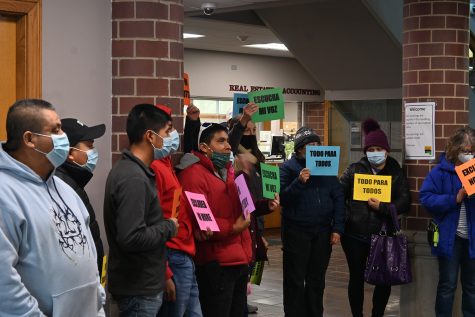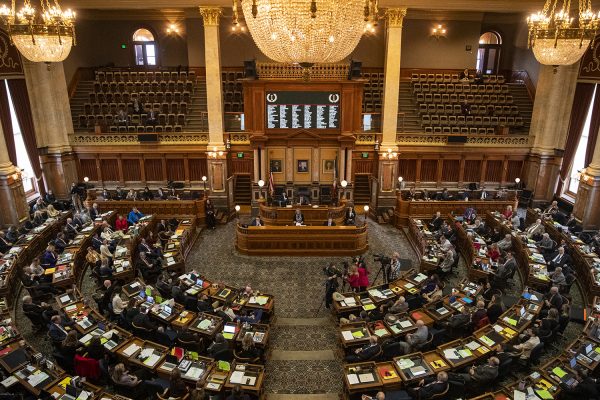Abby Finkenauer will remain on the primary ballot, Supreme Court decides
The Iowa Supreme Court reversed a lower court’s decision that found Finkenauer did not have enough valid signatures to be on the ballot.
U.S. Senate candidate Abby Finkenauer, sitting next to her husband, Daniel Wasta, listens to oral arguments before the Iowa Supreme Court in Des Moines on Wednesday, April 13, 2022, in her appeal of a judge’s ruling that says she cannot appear on the June 7 Democratic primary ballot. (Kelsey Kremer/The Des Moines Register)
April 15, 2022
Abby Finkenauer will appear on the ballot in the June 7 Democratic primary election for U.S. Senate, the Iowa Supreme Court ruled on Friday.
Reversing a lower court’s decision, the court ruled there is no Iowa law stating missing dates on petition signatures is a means of disqualification.
The Iowa Legislature passed a law last year stating specific circumstances for means of disqualification of petitions. Not having the date of a signature was not stated to be a reason for disqualification of a petition.
“We sustain the State Objections Panel’s decision to reject the objections as to those three signatures. This means that we reverse the carefully considered ruling of the district court and remand with directions to dismiss the objectors’ petition,” the court wrote in its opinion on Friday.
The ruling comes after a weeklong process of determining Finkenauer’s presence on the primary ballot. A pair of Iowa Republicans, Kim Schmett and Leanne Pellett, brought the suit claiming that three of Finkenauer’s signatures were invalid because they had missing or incorrect dates.
In a press call on Friday, Finkenauer said the Iowa Supreme Court’s decision was a victory for democracy and Iowa. She called the legal challenge to her candidacy a partisan attack on her and her campaign.
“The reality is, with this unanimous decision by the Iowa Supreme Court affirming that we met the requirements to be on the ballot for the United States Senate, that this is something again that is important — not just for Democrats but for Republicans and independents and anybody that cares about the direction of our state and our country,” Finkenauer said.
Alan Ostergren, a conservative lawyer representing the objectors, said in a tweet thread Friday the ruling by the Supreme court showed the Legislature has to amend its legislation to make more clear what is required in a nomination petition.
“The Iowa legislature needs to reform this statute again and expressly list what has to be on a nomination petition and what the consequence is for failing to have that information present,” he wrote.
While the court focused on a recent statute of Iowa Code, Schmett and Pellett focused on another. The law for nominating papers says that each signer “shall add” their address and date of signing to the petition. The Republicans in the case, and the lower court’s decision, argued that language made the date a statutory requirement.
Finkenauer’s lawyer, Gary Dickey’s main argument, which the Supreme Court agreed with, was that there was no Iowa law stating a candidate’s petition can be disqualified if signatures were missing dates.
A candidate for U.S. Senate is required to submit 3,500 signatures, including 100 signatures from at least 19 Iowa counties. The campaign turned in 5,000 signatures, but some counties had barely above the threshold for qualification.
“The only reason these issues were litigated is that the Abby Finkenauer campaign failed to turn in enough signatures to have a comfortable margin – something every other political campaign was able to do this cycle,” Ostergren wrote in his thread.
Finkenauer brushed off questions of why her campaign did not collect more signatures in some counties in her press call Friday.
“So we did exceed the number of requirements. In fact we exceed the amount of counties we needed,” Finkenauer said. “ In fact, we also exceeded the number overall that we needed by over 1,500 signatures. What happened was the Republicans spent thousands and thousands of dollars and countless hours trying everything they could…literally making up things trying to take us off the ballot.”













